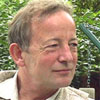| http://www.edge.org/q2005/q05_10.html#humphrey |
|
NICHOLAS HUMPHREY
If this is right, it provides a simple explanation for why we, as scientists or laymen, find the "hard problem" of consciousness just so hard. Nature has meant it to be hard. Indeed "mysterian" philosophers—from Colin McGinn to the Pope—who bow down before the apparent miracle and declare that it's impossible in principle to understand how consciousness could arise in a material brain, are responding exactly as Nature hoped they would, with shock and awe. Can I prove it? It's difficult to prove any adaptationist account of why humans experience things the way they do. But here there is an added catch. The Catch-22 is that, just to the extent that Nature has succeeded in putting consciousness beyond the reach of rational explanation, she must have undermined the very possibility of showing that this is what she's done. But nothing's perfect. There may be a loophole. While it may seem—and even be—impossible for us to explain how a brain process could have the quality of consciousness, it may not be at all impossible to explain how a brain process could (be designed to) give rise to the impression of having this quality. (Consider: we could never explain why 2 + 2 = 5, but we might relatively easily be able to explain why someone should be under the illusion that 2 + 2 = 5). Do I want to prove it? That's a difficult one. If the belief that consciousness is a mystery is a source of human hope, there may be a real danger that exposing the trick could send us all to hell. |
 I believe that human consciousness is a conjuring trick,
designed to fool us into thinking we are in the presence
of an inexplicable mystery. Who is the conjuror and
why is s/he doing it? The conjuror is natural selection,
and the purpose has been to bolster human self-confidence
and self-importance—so as to increase the value
we each place on our own and others' lives.
I believe that human consciousness is a conjuring trick,
designed to fool us into thinking we are in the presence
of an inexplicable mystery. Who is the conjuror and
why is s/he doing it? The conjuror is natural selection,
and the purpose has been to bolster human self-confidence
and self-importance—so as to increase the value
we each place on our own and others' lives.